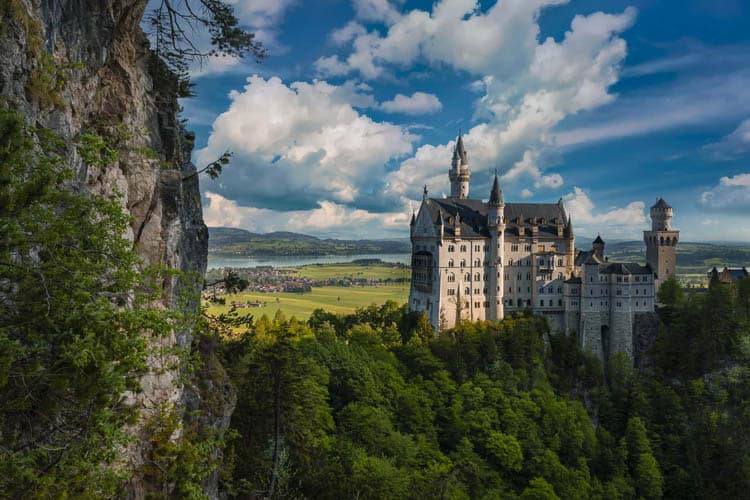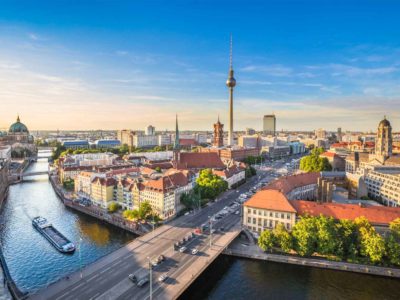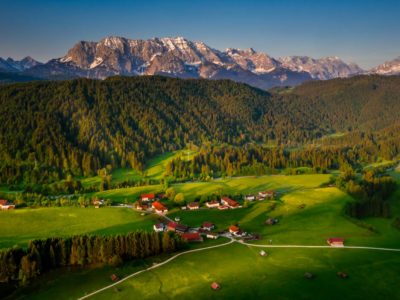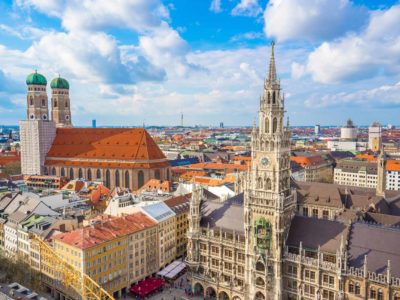Found in Central Europe, Germany is a country comprised of 16 states.
It has the largest national economy in Europe and the third-largest car production in the world (famous companies from Germany include BMW, Volkswagen, and Mercedes-Benz).
More than that, Germany is renowned for its stunning architecture, historic cathedrals and castles, forests and mountains, and great beer and food. There is plenty to see and explore here.
Table of contents
Table of Contents
Fast Facts about Germany
- Power voltage is 230 V at 50 Hz. Type F.
- Germany currency is the euro and 1 euro is equal to 1.12 USD. You can check up to date currency exchange at XE Currency Converter.
- Germany has a renowned transportation system. Buses and trains are considered the best ways to get around the city.
- You do not need a visa when visiting Germany as long as your visit does not exceed 90 days. You will need a passport that has been valid for at least 3 months.
- The most popular cellular networks in Germany are Deutsche Telekom, Vodafone, and O2. Prepaid Sim cards can be purchased through these networks. Photo ID (such as Passport) and a German address are required.
- We use KnowRoaming $3.99 per day Unlimited data. PlanetD readers receive an extra 50% off using promo code DDSave50
- Value-added tax (VAT) comes at 19%. Tax reductions may be issued for certain purchases, like food, hotels, and public transportation. To learn more, click here: https://www.germany.info/us-en/service/09-Taxes/vat-refund/906296
- To say hello in German, it’s “hallo.” To say goodbye, say “tschüss” (pronounced like “juice” but with “tch” replacing the “j”).
Things to See and Do in Germany
- Hike the Mountains of Bavaria and visit the Alpspix lookout and Germany’s highest peak, Zugspitz.
- Neuschwanstein Castle: The most photographed building in Germany, and the castle that inspired Disney’s Sleeping Beauty, it is considered the ultimate fairy tale.
- Don’t miss visiting Berlin. Germany’s most artistic and exciting city.
- Take a drive along Germany’s Romantic Road
Germany Travel Guides
Budgeting
Accommodation
Budget – Germany offers many budget hotels ranging from 22 to 45 euros a night.
Mid Range – For mid-range hotels, expect to pay roughly 65 euros a night.
High End – To say hello in German, it’s “hallo.” To say goodbye, say “tschüss” (pronounced like “juice” but with “tch” replacing the “j”).
Check out our favorite booking platforms Booking.com, Tripadvisor and Air B&B for the best deals on accommodation
Food
Food: There are a variety of bars and restaurants located in Germany. You can find things like wraps and doner kebabs for 4-6 euros each.
A cappuccino will cost around 3 euros while pastries can start at 2 euros. The restaurants in Europe have many great dishes, such as their national dish Sauerbraten (pot roast dish, usually made with beef).
Less expensive restaurants offer meals for 8-15 euros, while more mid-range restaurants tend to charge 30-60 euros.
The Best Ways to Get Around Germany
Getting to Germany:
The Frankfurt and Munich airport are the two most popular airports to fly to.
Flights: You can check for the best flights to Germany on Skyscanner.
Transportation:
Train: Trains are a good way to travel for a long distance. Tickets cost 30 to 50 euros for a one-way trip. If you plan to use the train a lot, consider getting a multi-day pass to save some money
Bus: The public transportation system in Germany is highly efficient and can get you most places you need to go. Tickets for one-way bus fare start at 2.8 euros.
Taxis/Uber: Uber is available in Germany in Berlin, Frankfurt, Munich and Düsseldorf.
Taxi prices vary from city to city, but average €3.50 to start and then €2 per km.
Car Rental: Renting a car: To rent a car in Germany, a U.S. driver’s license is needed, with some places also requiring an International Driver’s License purchased before your trip. You need to be over 21 to rent. 60 euros per day is the starting price.
You can also compare prices here
When to go To Germany
- May and October are two of the best months to visit Germany.
- In May, the cherry blossoms are out, temperatures warm up to 65 degrees Fahrenheit, and it is not yet too crowded with tourists, which means you can get better deals.
- October is another popular month to visit, as the annual Oktoberfest beer festival is held in Munich, as well as the Festival of Lights in Berlin.
Where to Stay in Germany
Platzl Hotel – This is a great hotel to stay at when you’re visiting Munich. It’s located right in the city center so you’ll have access to restaurants and shops whenever you want to go out. They offer free breakfast and Wi-Fi.
Hotel Indigo Berlin – You’ll love this hotel when you’re staying in Berlin. It’s close to Alexanderplatz so you’ll find be close to the bustling area. They have an outdoor terrace to enjoy during the warm weather and a highly-rated restaurant.
Le Meridien Hamburg – When staying in Hamburg, check out this chic hotel. They offer breakfast at the top of the 9th floor with a view of the city. There’s also a fitness center and bicycles to rent.
Check out our favorite booking platforms Booking.com, Tripadvisor and Air B&B for the best deals on accommodation in Germany.
What to Pack for Germany
Germany has a varied landscape and depending on where and when you are going, you will need to pack accordingly
The summers are hot, but in the Bavarian Alps, expect cool mornings and evenings.
Nights can be chilly any time of the year. Germany has a proper winter and if you are visiting Christmas markets or ski resorts, you will need winter clothes.
See our post How to pack for the winter deep freeze.
- Sunglasses: Great for the many sunny days that Germany has, especially for those venturing outdoors.
- Waterproof clothes/shoes: With so many hiking destinations, these are a must to keep your feet and clothes dry.
- Power adapter: As Germany uses the UK power voltage, an adapter will help keep all your electronics charged appropriately.
See our packing tips: packing tips
Germany Travel Guide: Best Booking Resources
Whenever we travel to we make sure to start with these companies. We have tried a lot of different ones over the years and all of these have consistently proven to be the best when it comes to offering great prices.
We have used every one of these personally and continue to do so.
- Booking.com: This is our go site to when comparing prices for accommodation. It usually has the cheapest prices, especially in Europe and we love their interface. Not to mention you get free cancellation and you are guaranteed the best price.
- Trip Advisor: What we like about Trip Advisor is that we can look at all the reviews and then book our accommodation. TripAdvisor is where we go when we want to compare prices with multiple accommodation providers.
- VRBO: is the main search engine we use when we are looking for a home or apartment rental. It can sometimes be cheaper than hotels and it is the best way to stay in areas that offer a more local feel.
- Hostelworld: With one of the largest databases of hostels in the world, Hostelworld is the go-to site when you are looking for budget accommodation.
- Skyscanner: This is the first place we check for flights. It consistently comes back with the cheapest and best options. It allows us to compare a lot of airlines to get the best price.
- Rome 2 Rio: If you want to see how to get somewhere by plane, train, bus, ferry or car Rome2Rio lays it all out for you as well as related costs.I love how they show it all to you on a Google Map and it works offline.
- Get Your Guide: For all your day trip and city guide needs, we use Get Your Guide. It has the world’s largest collection of things to do with more than 30,000 activities in 7500 destinations.
- World Nomads Insurance: When traveling to Italy you should always have travel insurance. We have found the best bang for your buck is by far World Nomads.
Germany Travel Guide: Related Articles
To browse all our articles and guides about Germany click here




